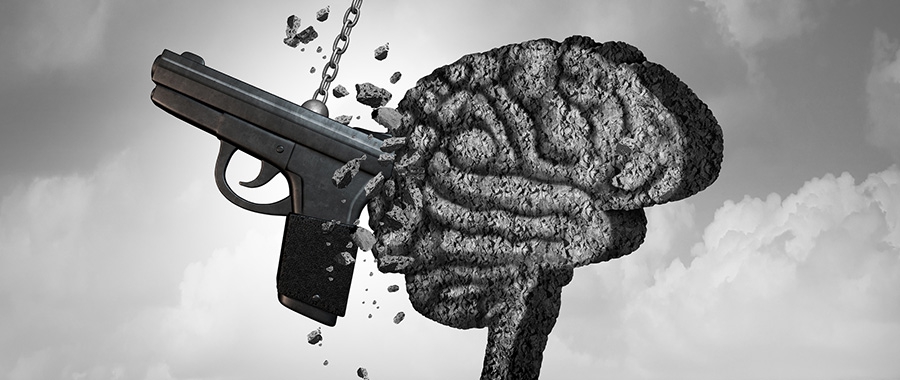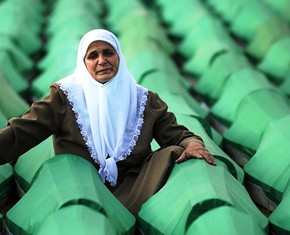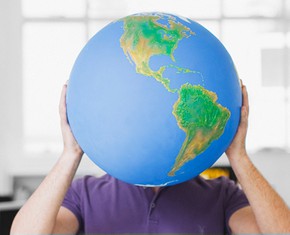The views expressed in our content reflect individual perspectives and do not represent the authoritative views of the Baha'i Faith.
Here are two of the biggest and most important questions anyone can ask: Is biology destiny—and are we human beings inherently violent creatures?
Scientists today differ when they answer those crucial questions. Some believe that we’re biologically evolved to be aggressive and violent—while others believe that human beings tend to naturally cooperate rather than compete in warlike ways.
One biological anthropologist, University of Notre Dame Professor Agustín Fuentes, says that while we wouldn’t question the all-too-common headline “Four Killed in New York City Today,” we’re unlikely to ever read a headline that says “8,299,996 People in New York City Got Along Today.” After all, he points out, most people aren’t violent, so why do we think violence is innate in all people?
Increasingly science has begun to develop a more subtle, non-binary view of this previously either/or question, as expressed here by Professor Alisse Waterston, president of the American Anthropological Association (AAA), and a cultural anthropologist at the City University of New York who studies violence: “A major take-away from the anthropological literature,” Professor Waterston says, “is that humans have the potential, which is different from the tendency, to be violent.” Another well-known anthropologist, David P. Barash, explains the nuanced understanding this way:
In short, when it comes to violence and war, evolution’s bequeathal to Homo sapiens is best symbolized by the two-faced Roman god Janus, who represented the first month of each year because he looks backward to the year just finished as well as forward to the one that is beginning. Similarly, our Janus-faced biological heritage can predispose human beings toward either violence or peace, depending on the circumstances. – “Are Human Beings Naturally Violent and Warlike?” Philosophy Now Magazine, November/December 2014.
The Baha’i teachings, for almost two centuries now, have encouraged us to view human nature in this same way—not so much predisposed to aggression or violence, but subject, as a matter of will, to a spiritual choice between two opposing aspects of our characters:
… this human spirit has two aspects: one divine and one satanic—that is, it is capable of both the greatest perfection and the greatest deficiency. Should it acquire virtues, it is the noblest of all things; and should it acquire vices, it becomes the most vile. – Abdu’l-Baha, Some Answered Questions, newly revised edition, p. 163.
But despite the science and the spirituality that upholds this new view, many people still believe that we humans are inherently violent and naturally predisposed to war. If that’s true, it means violence and conflict will always occur—and that all human efforts toward peace will ultimately end in futility. If that’s true, we would all need to resign ourselves to viciousness, abuse, bullying, brutality and warfare without end.
On the contrary, Baha’is believe that humans have a choice:
Indeed, so much have aggression and conflict come to characterize our social, economic and religious systems, that many have succumbed to the view that such behaviour is intrinsic to human nature and therefore ineradicable.
With the entrenchment of this view, a paralyzing contradiction has developed in human affairs. On the one hand, people of all nations proclaim not only their readiness but their longing for peace and harmony, for an end to the harrowing apprehensions tormenting their daily lives. On the other, uncritical assent is given to the proposition that human beings are incorrigibly selfish and aggressive and thus incapable of erecting a social system at once progressive and peaceful, dynamic and harmonious, a system giving free play to individual creativity and initiative but based on co-operation and reciprocity.
As the need for peace becomes more urgent, this fundamental contradiction, which hinders its realization, demands a reassessment of the assumptions upon which the commonly held view of mankind’s historical predicament is based. Dispassionately examined, the evidence reveals that such conduct, far from expressing man’s true self, represents a distortion of the human spirit. Satisfaction on this point will enable all people to set in motion constructive social forces which, because they are consistent with human nature, will encourage harmony and co-operation instead of war and conflict. – The Universal House of Justice, October 1985, The Promise of World Peace, p. 1.
Looking at the human experience in this way—seeing violence and warfare as “a distortion of the human spirit”—allows us to believe in, plan for and work towards a peaceful future, when the violence and aggression we experience now have been reduced and even eradicated by an increasingly harmonious and cooperative civilization. The Baha’i teachings say that a peaceful, non-violent future is our human birthright:
From a physiological standpoint human beings differ from carnivorous animals. Their teeth, unlike the lion’s, are not made for tearing flesh. All the functions of the human body are created for love and good fellowship and it is evident that the continuation of this world of humanity depends upon the practice of these attributes and the destruction of the world of humanity lies in war and conflict. But through long custom and usage savagery and blood-thirstiness are kneaded into the very being of man and the Godlike attributes which contribute to the powers of treaty-making and international laws have not been sufficiently strong to stem the tide of warfare.
There must needs be some tremendous force to upraise the standard of eternal friendship between nations and this force must come through self-sacrifice and universal service. – Abdu’l-Baha, Divine Philosophy, pp. 179-180.
In the next essay in this series, we’ll explore the nature of that “tremendous force” the Baha’i teachings describe, and what it means for each one of us.
















Comments
Sign in or create an account
Continue with Googleor